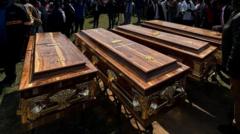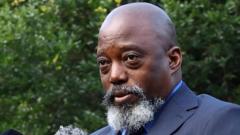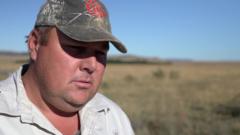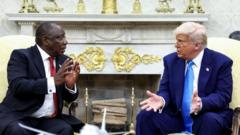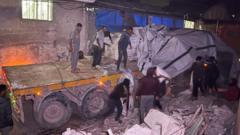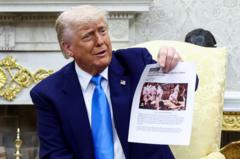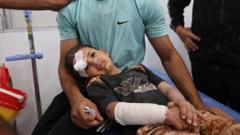The humanitarian crisis in the DR Congo, accentuated by M23 rebel activity, involves multiple nations with conflicting agendas, including Rwanda, Burundi, Uganda, and South Africa. As the regional situation becomes increasingly complex, the roles of these countries reveal a multifaceted struggle for power, influence, and resources.
Understanding the Power Dynamics Behind the DR Congo Crisis
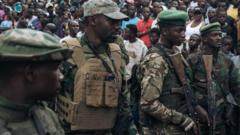
Understanding the Power Dynamics Behind the DR Congo Crisis
The ongoing conflict involving the M23 rebels in the DR Congo has deep implications, influenced by neighboring nations' varied interests and histories.
The Democratic Republic of Congo (DRC) finds itself in a precarious crisis, with the Rwandan-backed M23 rebel group capturing extensive territories in the mineral-laden eastern part of the nation. This upheaval has ignited a humanitarian disaster and intensified diplomatic tensions with several neighboring countries. Both East and Southern African regional bodies are converging for an emergency summit to strategize on mitigating the escalating violence.
Central to this crisis is DRC's President, Félix Tshisekedi, who aims to reclaim lost territories, particularly the key city of Goma. Tshisekedi accuses Rwandan President Paul Kagame of supporting the M23 rebels with military resources, asserting that Rwanda seeks to exploit the DRC's rich mineral resources while destabilizing his government. Despite a UN report backing Dew Congo's allegations against Rwanda, Tshisekedi's calls for international action have not translated into tangible support.
Kagame, on the defensive, maintains that Rwanda is intervening primarily for security reasons against Hutu militias linked to the 1994 genocide, arguing that if left unchecked, this conflict could spill over into Rwanda itself. The Rwandan government insists that the DRC should resolve its internal conflicts independently, without negotiations with the M23. Yet, analysts suggest that a larger goal lies behind Rwanda's intervention: retaining influence in eastern DRC.
Burundi, sharing border and ethnic ties with Rwanda, sees the M23's advances as a potential threat, prompting President Evariste Ndayishimiye to reaffirm that Burundi's military is ready to act against further Rwandan incursions. Relations between Rwanda and Burundi are historically fraught, with underlying fears of conflict spilling into their territories.
Meanwhile, Uganda maintains a complicated stance, having deployed troops for security purposes but also suspected of supporting the M23 rebels. President Yoweri Museveni's government is accused of allowing rebel activities from its territory while also working with DRC forces to combat different militant threats.
South Africa has taken a more active role, having experienced casualties in military operations against the M23. Tensions escalated into a public spat between South African and Rwandan leaders, highlighting a divide within the regional dynamics: the East African Community (EAC) leans towards Rwanda's position, while the Southern African Development Community (SADC) shows solidarity with DRC.
The interconnected nature of these political maneuvers illustrates a complex web of alliances and hostilities, as each nation seeks to navigate a path that preserves its interests in the face of an evolving conflict.

